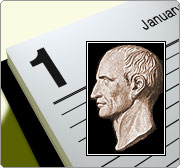History of January 1st New Year Vs Vedic New Year
Published by Thinking Boxx
24th September 2021 19:45 PM IST
Julian Calendar: January 1st Officially Instituted as the New Year. In 46 B.C. Julius Caesar introduced a new, solar-based calendar that was a vast improvement on the ancient Roman calendar, which was a lunar system that had become wildly inaccurate over the years. Bottom line: There's no astronomical reason to celebrate New Year's Day on January 1. Instead, our modern New Year's celebration stems from the ancient, two-faced, Roman god Janus – for whom the month of January is also named. One face of Janus looked back into the past, and the other peered forward to the future. For Dionysius, the birth of Christ represented Year One. He believed that this occurred 753 years after the foundation of Rome. The Line Islands (part of Kiribati) and Tonga, are examples of the first places to welcome the New Year, while Baker Island (an uninhabited atoll part of the United States Minor Outlying Islands) and American Samoa are among the last. Since the years of the Common Era are labeled "AD," standing for anno Domini or “in the year of the lord” in Latin, one might assume that Jesus was born in the Year 0. Specifically, he is commonly believed to have been born eight days before the New Year on December 25, 1 B.C.E. There is no year zero in this scheme; thus the year AD 1 immediately follows the year 1 BC. This dating system was devised in 525 by Dionysius Exiguus of Scythia Minor, but was not widely used until the 9th century. At the end of 29 December 2011 (UTC−10:00), Samoa advanced its standard time from UTC−11:00 to UTC+13:00 (and its daylight saving time from UTC−10:00 to UTC+14:00), essentially moving the international date line to the other side of the country.
 |
Complete history of January 1 When, why and how to celebrate New Year
January 1
Today's article will open the whole history of January 1 along with the greetings of the new year.
As you all know that as soon as January 1 comes, the influx of congratulations breaks.
Why, who and when started the English calendar in independent India. In November 1952, the Panchang Reform Committee was formed by the government of Pandit Jawaharlal Nehru, in which Dr. Meghnath Shah was made the chairman. He was given the responsibility to see which calendar would be right for India's future and government work. You analyze it and submit your report to the government. Just three months later, on 18 February 1953, under the chairmanship of Dr. Meghnath Shah, he submitted his report to the government. In which it was written that Vikram Samvat should necessarily be given place along with this English calendar. But the Nehru government had formed this committee so that the Hindus would be satisfied. It was not intended that the report submitted by the committee would be recognized. And it was said that the calendar which the committee would recommend would be implemented in the whole of India.
Rejecting this report, the Pandit Jawaharlal Nehru government implemented the English calendar on 22 March 1957 and made a law. And since today or in the coming time also all the work is done or known on this calendar. Whereas there is nothing scientific in this calendar which can satisfy anyone. In this calendar there is no analysis of planets and constellations. And every year 9 minutes 11 seconds gets reduced due to this calendar. If it continues like this, then this world will go far behind. Everyone is facing this problem. January
Anyway, the words of these Christians cannot be accepted. Who are fighting on the birthday of their god Jesus. And have not agreed yet. The Greek calendar says that Jesus was born on January 7. Whereas in the Church of Israel it is said that Jesus was born on January 6. Whereas there is a book Life of Christ whose author is Din Farah who has clearly stated in his book that the birthday of Jesus started being celebrated on 25th March around 500 AD. Before that it was January 6. When these people are fighting for their own God Jesus, how will their calendar be valid? But still why the Girgarian calendar was implemented by Nehru. Let's know.
January 1
Before 1752 when only Vikram Samvat was applicable in our country. And the same was implemented in other countries as well. So when in our country the next day was after sunrise. That is, the next day was considered at 5.30am. There is a difference of only 5.30 hours in England i.e. UK and India also. According to the Vikram Samvat at that time, the Panchang was applicable in the whole country. And when it was 5.30am it was considered the next day everywhere. That's why 12.30pm in Britain was considered a new day. Because the time difference between India and Britain is 5 hours. But according to India at that time, the next day was all over the world. But now it is not so because now at 12 o'clock the day changes all over the world. We copied England while Britain followed us. This only dates back to 1752. Not too old.
Picture source Google














0 Comments